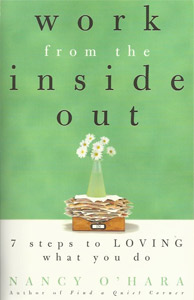…continued from 7 Steps to Loving What You Do – Discovery 1:5 – Our Ordinariness
“Expectation is a premeditated resentment!” When I heard someone exclaim this many years ago, it reached my gut and exploded there sending shock waves of truth to every part of my being. It gave me a keener and deeper understanding of the first two words I remember hearing from my spiritual teacher: “Expect nothing!” Yet when his incantation—“Expect nothing. Expect nothing. Expect nothing,”—first reached my ears, I didn’t have the slightest idea what it meant. My life up to that point had been all about expectations and so filled with them that I thought expectations were not only normal but obligatory. I thought that having expectations meant that I was engaged in my life and that I cared about the course it took. I thought that having expectations was the only way I could achieve my goals. And yet I didn’t really think so much about expectations at all. I simply knew I had them. Especially when I was asked to expect nothing. And it wasn’t until then that I was able to link my disappointments in life to the expectations I had.

Ms Liberty
Today I know that disappointment is always preceded by an expectation. Every feeling of hurt, any mood of anger, every judgment, each criticism and all frustrations are the results of expectation. And these expectations are not always clearly in view. But whenever there is emotional irritation the source can invariably be found in the wellspring of expectation, a source that never seems to run dry.
From something as simple as being disappointed in a new movie because it didn’t live up to the hype—that is, we expected it to be fabulous—to the hurt and anger generated by our partner because he/she didn’t live up to the promise we thought we’d been given, our expectations cause us pain.
Expectations = disappointment = resentment. We set ourselves up for the inevitable fall when we have an expectation.
And though the fallout on a personal level is often hard to take—many of us suffer physical and mental breakdown when the unexpected happens—as a society, nothing seems to truly shock us anymore. Hence, we have all come to expect being disappointed in other people. As a result, many of us walk around with resentments, unaware that the real cause stems from our own expectations—expectations of ourselves, expectations of others, expectations of our jobs. And all these expectations emanate from fear.
All our disappointments, all our resentments and anguish can be traced back to their source: fear of not getting what we want and losing what we have. Our expectations were not fulfilled. We did not get what we expected to get. The scenario did not unfold as we imagined it. We lost something we expected to have forever. But nothing is forever. And, paradoxically, once we accept this we can forever be rid of the pain and grief that our expectations cause us.
Expectation rooted in fear is probably the most potent source of our emotional pain and suffering, especially when it comes to our work life.
If you have a resentment, no doubt you expected something that didn’t happen. And once you become aware that expectations lead to resentments, then the realization that you are the agent of your own suffering is not far behind. This truth is not something that is easy to swallow or even understand. And it will take time to get used to the idea that your expectations (which begin and end with you) not only interfere with your spiritual progress but also interfere with your having healthy, intimate relationships and strong, constructive work relationships—indeed, relationships of any kind.
And here’s another stunning truth that may initially shock you and perhaps even seem ludicrous. Hopes and dreams fall into the same category as expectations, that is, they are spoilers of the truth and roadblocks to spiritual freedom.
Hopes and dreams invariably carry an expectation on their tail, even if we take pains to avoid tacking any expectation onto them.
It is difficult to stop short of expectation when we harbor hopes and dreams, because as soon as we begin to describe to ourselves what we dream and hope for we lock ourselves into the scenario. And if what we end up with looks different, we experience disappointment and resentment—against the world, against someone else, against a situation, an organization, even against God. So if you feel resentment or anger toward someone, before expressing it and before it gets out of control, do a little inner search. Look for the root of it. Look for the expectation that spawned it. And then if you work on expunging the expectation, the resentment will have nothing to hold on to and will fade away and lose power over you.
Now, all of this does not mean that you can’t have goals, dreams and aspirations. But it does mean that you cannot afford to attach any expectation to any of it. So if ridding your life of expectation promises to reduce disappointment and resentment, why not give it a try? All you have to lose is something you’d rather not have anyway.
Let’s now examine the expectations you’ve nurtured all your life in relation to your work. And then let’s look at how even the smallest expectation on any given day can get in your way.
_________________________________________________
- When you were little did you have dreams, ideas or expectations of what you would be when you grew up? If so, write about them. Then write about where you are today and how this differs from your childhood vision. Are you where you imagined yourself to be? Does this please you? How do you feel? Write about all of this.
- Now write about the career expectations you had or didn’t have as a young adult. Write about your parents’ expectations of you and how they meshed with your own vision. Were there internal and external conflicts? Write about them.
- Write about the expectations you have today regarding your work—expectations of you, your boss, your co-workers, your company.
- At the end of the day review in your mind and in writing the disappointments you experienced at work (big and small) and the resentments that were activated. Trace each one to an expectation (there’s bound to be one) and examine that. Then practice letting go of the expectation. Do this exercise as often as you can (every day, once a week) and don’t expect anything to happen. Simply do the exercise.
_________________________________________________
You might be asking yourself, “If I eliminate expectations, hopes and dreams from my life, what’s left?” Good question. And the answer is a simple one. Now. That’s what’s left. Now. This moment. The everlasting, wonderfully rich present.
Expectation projects us into the future. When we finally do get there it’s always different than we imagined.
But if we stay in the present and live in anticipation of the future then we are right where we are, we have no illusions, and we can’t possibly be disappointed. Which means a life free of resentments.
As with any new skill, it takes some practice to master staying in the moment. We cannot expect to be proficient at eliminating expectation from our life simply because we want to and believe in the promise that we will be free of resentments and disappointments. After all, we have years of bad habits to wash away. But we can practice each day, each moment. Before too long you’ll acquire a sixth sense that will tell you when you’re crossing the thin line between anticipation and expectation and you’ll be able to rein it in before it moves into disappointment. So be patient, practice and enjoy the possibility of each moment.
To be continued…
from Work From the Inside Out – 7 Steps to Loving What You Do







I didn’t expect that I’d read THIS today! It’s a piece of writing that hits the nail on the head. Just as I suspected it would.